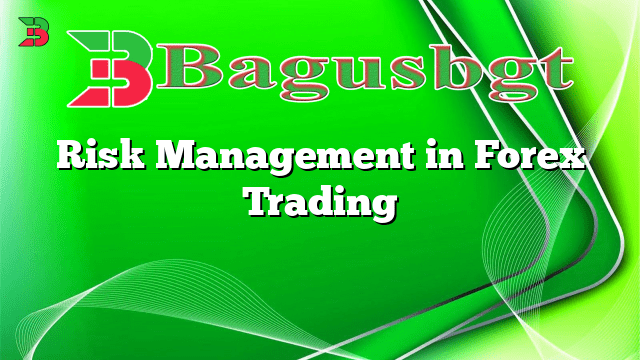Hello readers,
Welcome to this informative article about risk management in forex trading. In this article, we will explore the importance of risk management strategies in the dynamic world of forex trading. The foreign exchange market offers immense opportunities, but it is crucial to understand and manage the associated risks effectively. Let’s dive into the details!
1. Understanding Risk Management
Risk management in forex trading refers to the process of identifying, assessing, and controlling potential risks that may arise during trading activities. It involves implementing various strategies to minimize losses and protect investments.
One of the primary goals of risk management is to preserve capital. By setting limits on the amount of capital to be risked in each trade, traders can protect themselves from significant losses and avoid potential financial ruin.
However, it is important to note that risk management does not eliminate the possibility of losses entirely. It rather aims to strike a balance between risk and reward, ensuring that potential profits outweigh potential losses in the long run.
2. The Importance of Risk Management
Risk management is vital in forex trading for several reasons:
Capital Preservation: By implementing risk management strategies, traders can protect their capital from substantial losses, allowing them to continue trading and take advantage of future opportunities.
Emotional Control: Forex trading can be highly emotional, and emotions often lead to impulsive and irrational decisions. Risk management helps traders maintain discipline and control their emotions, preventing them from making impulsive trades based on fear or greed.
Consistency: Implementing a well-defined risk management plan promotes consistency in trading. It ensures that traders do not deviate from their strategies and trade impulsively, leading to potential losses.
Long-Term Profitability: Successful risk management allows traders to stay in the game and capitalize on profitable opportunities over the long term. By minimizing losses, traders can protect their accounts and generate consistent profits.
3. Risk Management Strategies
There are various risk management strategies that forex traders can employ:
1. Stop Loss Orders: Placing stop loss orders helps limit potential losses by automatically closing a trade when it reaches a predetermined price level. This strategy ensures that losses are controlled and prevents traders from holding losing positions indefinitely.
2. Take Profit Orders: Take profit orders allow traders to set a specific price level at which a trade will automatically close to secure profits. This strategy helps in capitalizing on favorable market movements while avoiding potential reversals.
3. Risk-to-Reward Ratio: Traders should always assess the potential reward relative to the risk before entering a trade. A favorable risk-to-reward ratio ensures that potential profits outweigh potential losses.
4. Position Sizing: Determining the appropriate position size based on account balance and risk tolerance is crucial in risk management. Traders should not risk an excessive amount of their capital on a single trade, as it may lead to significant losses.
5. Diversification: Spreading investments across different currency pairs and markets can help minimize risk. Diversification reduces the exposure to a single trade and mitigates the impact of adverse market conditions.
4. Advantages of Effective Risk Management
Effective risk management in forex trading offers the following advantages:
1. Reduced Losses: By implementing risk management strategies, traders can significantly reduce potential losses, protecting their capital and preserving financial stability.
2. Increased Confidence: Knowing that potential risks are under control boosts traders’ confidence, allowing them to make informed decisions and stick to their trading plans.
3. Consistent Profits: Successful risk management ensures that losses are limited, enabling traders to generate consistent profits over time. This stability contributes to long-term profitability.
4. Emotional Control: Risk management helps traders control their emotions and avoid impulsive decisions driven by fear or greed. This leads to more rational and objective trading practices.
5. Disadvantages of Inadequate Risk Management
Failure to implement proper risk management strategies can lead to the following disadvantages:
1. Large Losses: Without risk management measures, traders are exposed to significant losses that can deplete their trading accounts, making it difficult to recover financially.
2. Emotional Turmoil: Inadequate risk management often results in emotional distress, leading to impulsive decisions, stress, and frustration. This can negatively impact overall trading performance.
3. Inconsistency: Lack of risk management leads to inconsistent trading practices, making it challenging to achieve long-term profitability. It often results in erratic trading decisions based on emotions rather than sound analysis.
4. Account Wipeout: Failing to implement risk management measures puts traders at risk of losing their entire trading capital. Without proper risk controls, a single bad trade can wipe out the account.
6. Alternative Approaches to Risk Management
While the strategies mentioned above are widely used, alternative approaches to risk management in forex trading include:
1. Hedging: Hedging involves opening additional positions to offset potential losses in existing positions. It is a popular risk management technique that aims to reduce exposure to adverse market movements.
2. Trading Psychology: Incorporating psychological factors into risk management can enhance decision-making. This approach focuses on understanding one’s emotions and biases to make more rational trading choices.
3. Automated Trading Systems: Automated trading systems use pre-defined algorithms and risk management rules to execute trades. These systems eliminate human emotions and ensure consistent risk management practices.
7. Risk Management in Practice
Let’s explore a practical example to illustrate the application of risk management strategies in forex trading:
| Risk Management Strategy | Description |
|---|---|
| Stop Loss Orders | Placing stop loss orders at 2% below the entry price to limit potential losses. |
| Take Profit Orders | Setting take profit orders at 3% above the entry price to secure profits. |
| Risk-to-Reward Ratio | Ensuring a minimum risk-to-reward ratio of 1:2 for each trade, favoring potential profits. |
| Position Sizing | Determining position size based on a maximum risk of 2% of the trading account balance. |
| Diversification | Spreading investments across different currency pairs to reduce exposure to a single trade. |
8. Frequently Asked Questions (FAQ)
Q: Why is risk management important in forex trading?
A: Risk management is crucial in forex trading to protect capital, maintain emotional control, ensure consistency, and achieve long-term profitability.
Q: What are the main risk management strategies in forex trading?
A: The main risk management strategies include stop loss orders, take profit orders, risk-to-reward ratio analysis, position sizing, and diversification.
Q: Can risk management completely eliminate losses in forex trading?
A: No, risk management cannot eliminate losses entirely. However, it aims to minimize losses and strike a balance between risk and reward for long-term profitability.
Conclusion
In conclusion, risk management is a crucial aspect of forex trading that cannot be overlooked. By implementing effective risk management strategies, traders can protect their capital, maintain emotional control, and achieve consistent profitability. It is essential to understand the advantages of risk management, the disadvantages of inadequate risk management, and alternative approaches to mitigate risks effectively. Remember, a well-managed risk is a step closer to success in the exciting world of forex trading.
 Bagus Banget Kumpulan Informasi terbaru dari berbagai sumber yang terpercaya
Bagus Banget Kumpulan Informasi terbaru dari berbagai sumber yang terpercaya

